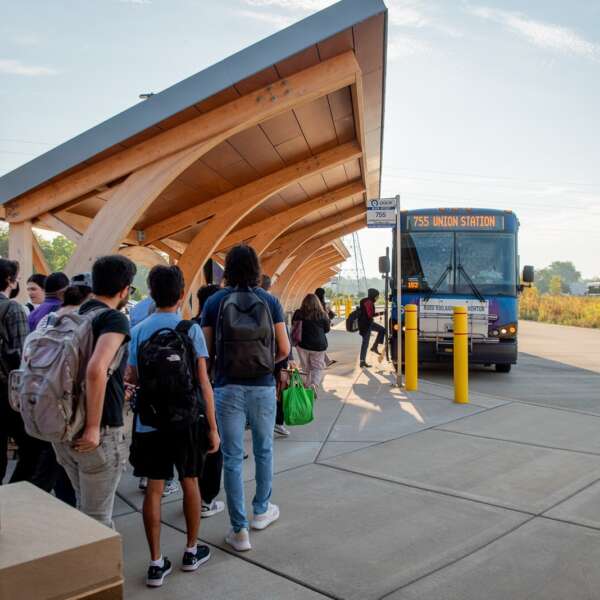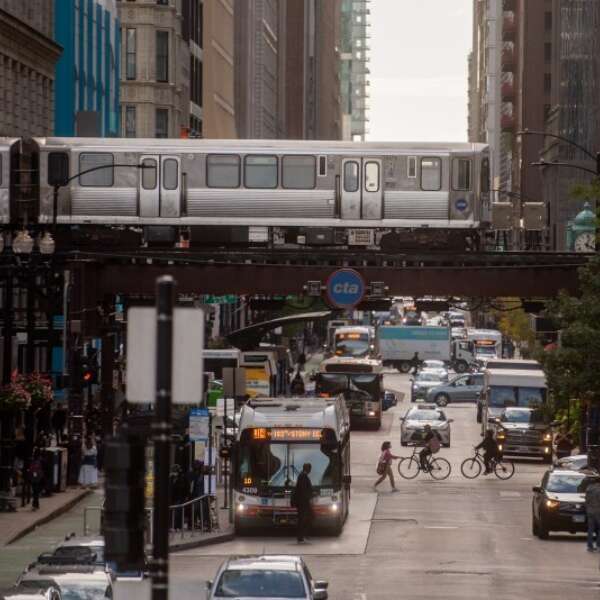Transportation Tuesday recap: Transit’s operating funding crisis
June 21, 2024
June 21, 2024

The rise of remote and hybrid work and its staying power post-COVID have resulted in significant losses in fare revenue and exacerbated the issue that most systems nationally have been experiencing for decades: drastic underfunding of public transportation.
The RTA system is facing a $730 million annual operating shortfall starting in 2026, which is expected to grow with the cost of providing service in future years. Increasing funding to fill this gap, or as the RTA 2024 legislative agenda recommends to go beyond the gap with $1.5 billion in public funding, would prevent severe service cuts and fare increases and help the region’s transit operators, which include CTA, Metra, and Pace, improve service, grow ridership, and create a more equitable system.
While the Chicago region is not alone in facing a severe operating shortfall in the near term, the RTA is in a relatively unique position of being able to monitor actions that other systems have taken already due to many peer regions reaching their fiscal cliffs earlier than 2026, when Chicago is forecasted to run out COVID relief funding. Several transit systems have worked with their state and local governments to provide new funding for public transportation to avoid the types of cost cutting measures that would be devastating to regional economies and communities who rely on transit.
RTA closed out this year’s Transportation Tuesday webinar series with a discussion on how other areas of the country have begun to address the transit operating crisis affecting almost every system, especially those that are more reliant on fare revenue. Attendees heard from policy experts on recently enacted legislation that provided significant new sustainable revenue sources for transit operations, including their perspectives on what made these policies succeed.
Kendra Johnson, RTA Government Affairs Associate, began the webinar with background information on the state of transit in the Chicago region, including recent positive trends in ridership growth, service expansion, and reduction of crime. She described the timing of the RTA’s fiscal cliff compared to other agencies and provided a brief overview of legislation affecting peer systems before introducing the session’s panelists for the bulk of the discussion.
Miguel Moravec, Senior Associate at the Rocky Mountain Institute, began the discussion by emphasizing that states are realizing they need more sustainable transportation systems—in both a climate and a fiscal sense. Moravec explained that the most compelling arguments for additional investment in public transportation in other states are the appeal of more household cost savings and increased travel safety by lowering the reliance on cars.
When pointing out that many believe the rise in remote working calls into question the need for more transit investment, Chris Van Eyken, Director of Research and Policy for TransitCenter, argued that sustainable transportation systems are critical for multiple activities outside of 9-5 work commutes and broader objectives such as reaching our nation’s climate goals by 2030.
Moravec added that using transit investments to improve a system and make it more reliable will bring back riders and attract new businesses to an area. He pointed to the Washington Metropolitan Area Transit Agency (WMATA), which used federal COVID relief dollars to implement service enhancements on their bus and rail systems in 2021 that provided more service all day and aligned with changing travel patterns established during the pandemic. This service expansion occurred while the system faced a pending fiscal cliff and agency officials pointed the associated ridership growth to strengthen their case for sustainable funding. These service increases have only continued, and the system has recently experienced positive gains in ridership and decreases in crime and fare evasion, much like we’re seeing here in the Chicago region.
The panelists continued the discussion by emphasizing that transit investment is not just beneficial to urban municipalities, but to suburban areas, too. Moravec highlighted some of the overlooked benefits that transit provides to communities such as easing traffic congestion, increasing walkability and pedestrian safety, and improving air quality—issues that highway expansion can often exacerbate. Panelists encouraged advocates to push greater accountability to ensure jurisdictions are implementing policies that support transit and ensure communities can reach equity and climate goals.
This session concludes this year’s Transportation Tuesday series. Recordings and recaps for the previous three sessions are available on the RTA’s YouTube page and the Connections blog. For additional opportunities to engage with the RTA and keep up to date with future initiatives, sign up for the Transit is the Answer Coalition.
Subscribe to our Newsletter
Related Articles
 For the third year in a row, regional transit ridership was up by double-digits in 2024
For the third year in a row, regional transit ridership was up by double-digits in 2024
Ridership across the Chicago region’s transit system continued to increase throughout 2024, according to the latest data from CTA, Metra, and Pace. The regio...
January 28, 2025 RTA is seeking $1.5 billion in annual operating funding. What would that mean for your commute?
RTA is seeking $1.5 billion in annual operating funding. What would that mean for your commute?
On January 15, RTA released Transforming Transit, a vision for the regional transit system with $1.5 billion in annual operating funding supported by a stron...
January 28, 2025 RTA proposes reforms to increase efficiency, transparency, and accountability across transit system
RTA proposes reforms to increase efficiency, transparency, and accountability across transit system
RTA is proposing a historic restructuring of the region’s transit governance to maximize the impact of new operating funding and ensure all riders experience...
January 24, 2025 What Chicago can learn from Philadelphia as the transit fiscal cliff approaches
What Chicago can learn from Philadelphia as the transit fiscal cliff approaches
Beginning in 2026, Chicago’s regional transit system faces a projected $770 million annual budget gap. At nearly 20% of the annual operating budget, this gap...
January 23, 2025 2024 recap: RTA brings 8 Transit Station Activations throughout region as part of pilot program
2024 recap: RTA brings 8 Transit Station Activations throughout region as part of pilot program
In spring 2024, RTA announced more than $120,000 in funding for eight Transit Station Activation projects as part of a pilot program with the goal of improvi...
January 9, 2025 Village of La Grange adopts comprehensive plan calling for more density near transit
Village of La Grange adopts comprehensive plan calling for more density near transit
In November, the Village of La Grange voted to adopt La Grange Forward, a comprehensive plan developed as part of the RTA’s Community Planning program. The d...
January 7, 2025